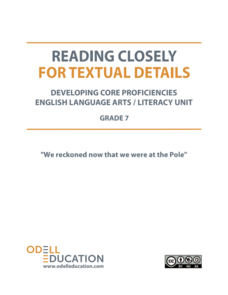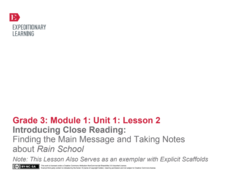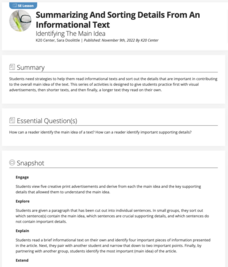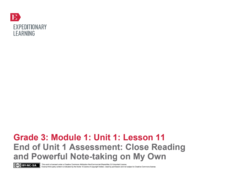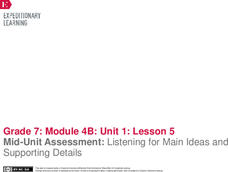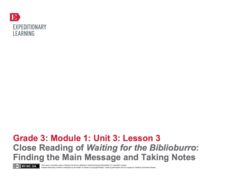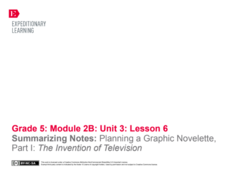EngageNY
Reading and Taking Notes on Colonial Trades
In the tenth instructional activity of this unit, young scholars learn to categorize information as they continue researching their colonial trade. During guided practice, the teacher models how to read informational text slowly while...
Achieve3000
Listening for Main Idea and Supporting Details
Did you hear that? It's the main idea! Teach your class listening and note-taking strategies for determining the main idea by following the steps provided in this plan.
Bright Hub Education
Using Evidence and Supporting Details in Writing
In expository writing, it is important to back up claims with evidence and details. Help your class to develop their writing with notes on different types of evidence. Once they have the basics down, practice with a sample thesis and...
Santiago Canyon College
Taking Notes for Science Class
Provide young scholars with the tools they need to succeed with this reference on the Cornell note-taking strategy. By breaking the content of lessons into main ideas, supporting details, and overall summaries, students are able to...
EngageNY
Storyboard Revision: Managing the Sequence of Events and Using Sensory Details
Mastering techniques from the resource, pupils give life to their writing, revising their storyboards to include sensory details and transitions. To finish, they participate in a peer critique process and use the feedback to further...
EngageNY
Taking Notes Using a Graphic Organizer: Inferring About Work and Play in Colonial America
What was life like in colonial America? Follow this instructional activity and your pupils will find out what people in colonial times did for work and for fun. Ask learners to compare and contrast the two texts and explain what the...
Curated OER
Build Masters: Identifying Details
Find key details in books using this note card strategy. Each reader gets six cards with the classic who, what, where, when, why, and how detail prompts. After they read the book, they choose a card and locate a key detail answering the...
Odell Education
Reading Closely for Textual Details: Grade 7
Enhance the reading experience with a set of lessons designed to improve textual analysis. Seventh graders use guiding questions to read both informational text and literature closely in the first part of the unit. Next, they work on...
Odell Education
Reading Closely for Textual Details: Grade 12
Help your class examine humanity's unpredictable nature through "Life Steps Almost Straight." Learners read various works from philosophers such as Viktor Frankl, The Buddha, and Nietzsche to gather textual evidence and explain their...
Olathe Public Schools
Topic, Main Idea, Supporting Detail, and Theme
Get your class members thinking about a reading passage's topic, main idea, supporting details, and theme with this interactive presentation that asks scholars to define, locate, and review each term.
Curated OER
Note Taking
Third graders get ready to take notes on a field trip. In this notetaking activity, 3rd graders take notes to remember what they've seen on a field trip. Students draw and analyze diagrams of what they have seen. Students access their...
EngageNY
Introducing Close Reading: Finding the Main Message and Taking Notes About Rain School
This second lesson in a larger unit is perfect for the beginning of the year because it explicitly teaches 3rd graders how to use close reading skills by identifying unfamiliar words, figuring out the gist, and defining important...
K20 LEARN
Summarizing and Sorting Details from an Informational Text: Identifying the Main Idea
Scholars participate in two activities that teach them to identify the main idea and key supporting details in informational text. Partners create a visual that reflects the main idea and key supporting details in an informational text...
Curated OER
Using Details from the Text
Explore non-fiction comprehension strategies with your class. They will visualize daily activities and label a 4 circle Venn diagram with related phrases. They must identify the overlapping sections as "main ideas," then complete a...
EngageNY
Reading Informational Text for Details: Meg’s Rainforest Experiment (Pages 17–20)
Take good notes. Scholars record information in their note catcher sheets as the teacher reads aloud pages 17-20 of The Most Beautiful Roof in the World. Learners then reread parts of the text in groups and rotate to share the notes they...
Curated OER
Using Details From The Text
Begin this expository writing activity by reading a non-fiction book of your choice and modeling expository writing. The plan suggests The Trip of a Drip by Vicki Cobb but notes that other texts will work. Learners then choose a...
Curated OER
A Seashell Lesson: Writing for Detail and the Scientific Process
Practice descriptive language in this lesson, which prompts elementary and middle schoolers to write detailed descriptive sentences describing a seashell. They write a description of a shell, create an illustration, and other students...
EngageNY
Analyzing Main Ideas and Details: Why Care about Water?
Pay attention to details! After completing text-dependent questions about paragraphs 10-12 of "Water is Life," scholars view the video "Why Care about Water. "They view the video three times and use a Main Idea and Details note-catcher...
EngageNY
End of Unit 1 Assessment: Close Reading and Powerful Note-Taking on My Own
As the final lesson plan in a larger beginning-of-the-year unit to establish routines and teach close reading skills, this plan is designed as an assessment piece. Using the story, The Librarian of Basra, learners independently complete...
EngageNY
Taking Notes Using a Graphic Organizer: Inferring About the Importance of Religion in Colonial America
Improve class understanding of colonial times by reading an informational text and filling out the accompanying graphic organizer. Class members work with a partner to read, take notes, make inferences, and synthesize information.The...
EngageNY
Mid-Unit Assessment: Listening for Main Ideas and Supporting Details
Pay attention! Scholars view the video"Why College Students Should Start Paying Attention to Water" multiple times to complete a note catcher. After discussing their thoughts with the class, learners watch "The Water Crisis Isn’t...
EngageNY
Close Reading of Waiting for the Biblioburro: Finding the Main Message and Taking Notes
Expose your class to Waiting for the Biblioburro, narrative nonfiction that will act as the bridge between ficiton and informational texts to come. Class members do a close reading of the text, looking at excerpts instead of the whole...
EngageNY
Summarizing Notes: Planning a Graphic Novelette Part 1: The Invention of Television
What's the story? Learners create the first of four storyboards about the invention of the television, incorporating narrative techniques and descriptive details. Next, they offer and receive feedback by participating in a peer critique...
Lake Middle School
Cornell Notetaking
The beauty of this colorful presentation about Cornell notes is that it begins with a very powerful statistic: "Those who take organized notes and do something with them remember 90-100% of the material indefinitely!" Zounds! Now there's...









